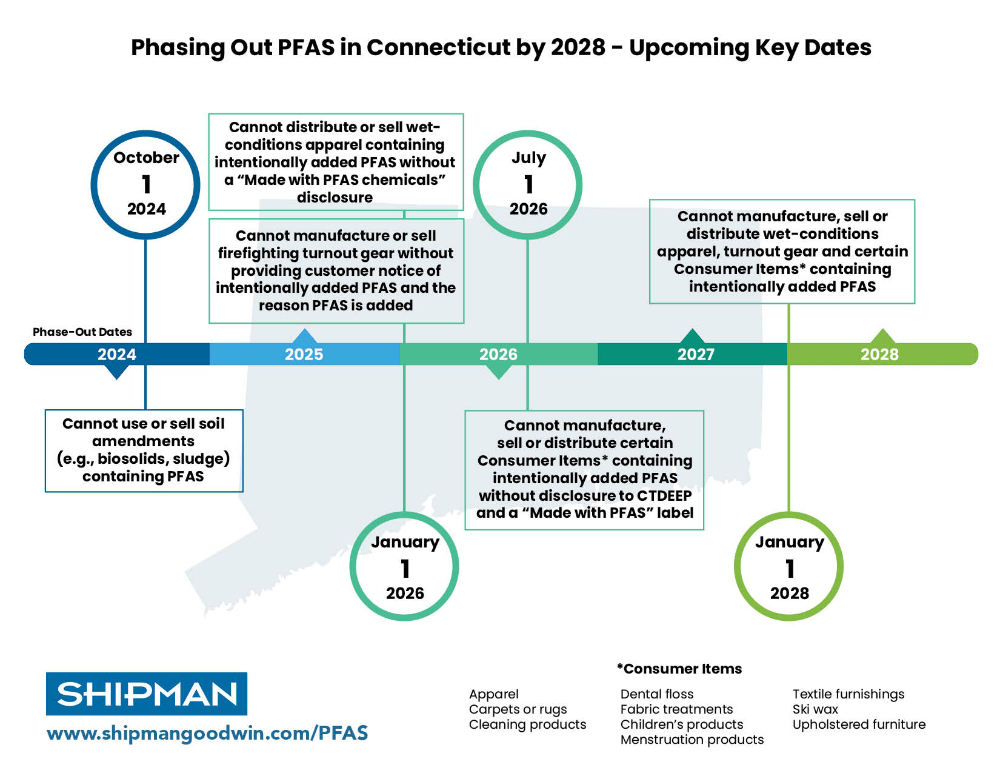Connecticut is making significant strides to phase out and ban per- and poly-fluoroalkyl substances in various consumer and safety products manufactured or sold in the state with the passage of Public Act 24-59 – An Act Concerning the Use of PFAS in Certain Products.
This new law quickly bans PFAS-containing biosolids (wastewater sludge) and implements a phased approach to ban certain consumer and safety products that contain "intentionally added" PFAS, with interim notice/labeling requirements to take effect before the bans are in effect.
PA 24-59 primarily aims to protect public health by limiting exposure to PFAS from common consumer and safety products to which PFAS has been "intentionally added."
That is, the law applies to products or a product component where PFAS was deliberately added during manufacturing to perform a specific function, as opposed to the incidental/unwanted presence or introduction of PFAS.
Environmental Concerns
Importantly, PA 24-59 is broad and does not include any waiver or exception provisions.
However, Gov. Ned Lamont and some legislators have indicated that a waiver process may be added in future legislative sessions, e.g., for products that cannot be replaced with a functionally equivalent alternative that is made without the intentional addition of PFAS.

For the uninitiated, PFAS are thousands of "emerging contaminants" at the center of increasing health and environmental concerns.
PFAS have been widely used in numerous commercial and industrial applications where their resistance to liquids, heat and stains are beneficial.
However, PFAS have recently gained national and international attention for being linked to environmental and health risks, including certain cancers, which has led to increased consumer awareness and scrutiny, new federal and state laws and regulations, and significant litigation.
Effects on Farmers, Firefighters
Starting Oct. 1, 2024, PFAS-containing biosolids or wastewater sludge are prohibited from being used or sold in Connecticut.
Although the use of biosolids in Connecticut by farmers as a cost-effective fertilizer is not extensive, PFAS contamination from biosolids has raised significant and more widespread concerns in other states (e.g., Maine), resulting in the closure of multiple farms.
Connecticut farmers applying biosolids should consider ceasing or phasing out the practice now, to be ready for the Oct. 1, 2024 deadline.
Starting Jan. 1, 2026, manufacturers or retailers of firefighting "turnout" gear containing intentionally added PFAS must notify the consumer at the time of sale that the gear contains PFAS and the reason PFAS were added.
With this law, Connecticut is the first state to prohibit intentionally added PFAS in certain firefighting gear.
However, PFAS-free alternatives are not yet widely available and are more expensive — and importantly, their protective qualities are still being evaluated.
Not surprisingly, it appears only a handful of fire departments across the country have started voluntarily purchasing PFAS-free gear.
If they haven't started already, fire departments should begin evaluating options to phase out and/or replace older equipment to ensure continuous emergency response preparedness and firefighter safety.
Notably, Connecticut firefighters recently filed a lawsuit against various manufacturers of PFAS.
Effects on Manufacturers, Distributors, Retailers
Starting Jan. 1, 2026, manufacturers, distributors and sellers of severe wet-weather apparel containing intentionally added PFAS must include the statement "Made with PFAS chemicals" if the product contains intentionally added PFAS.
Manufacturers are primarily responsible for labeling unless the wholesaler or retailer agrees to assume this responsibility.
Starting July 1, 2026, manufacturers, distributors, and sellers of consumer items (e.g., rugs/carpets, cookware, cosmetic products, dental floss, children's products, feminine products) containing intentionally added PFAS must label these products with the statement "Made with PFAS chemicals" if the product contains intentionally added PFAS.
Similarly, the wholesaler or retailer can agree to assume this responsibility from the manufacturer.
Additionally, with respect to the consumer items only, manufacturers must provide prior written notice to Connecticut's Department of Energy and Environmental Protection, detailing the PFAS' function, chemical composition, quantities, and types.
Manufacturers must adhere to the notice and labeling requirements to maintain production of severe wet-weather apparel and specified consumer product categories in Connecticut.
Failure to comply with these requirements would prohibit sales within the state, including via e-commerce.
Starting Jan. 1, 2028, the manufacture, distribution or sale of the regulated consumer and safety items containing intentionally added PFAS will be prohibited regardless of labeling, notice, or disclosures.
As a result, we recommend manufacturers, distributors and retailers begin now to identify alternative products and technologies that eliminate intentionally added PFAS in the products they make and sell.
Notably, Connecticut has joined a handful of other states (e.g., California, Colorado, Maine, Minnesota, Vermont, and Washington) with similar bans on these categories of products.
Act Now
In light of these rapidly developing regulatory requirements and impending bans on certain products that include PFAS (which list will likely grow in coming years), it would be prudent for manufacturers, distributors and retailers to take the following steps:
- Review of Supply Chain Management: Conduct a product lifecycle assessment to identify potential avenues through which PFAS may (intentionally and/or unintentionally) enter the production process, including water supplies and processing materials. Request information from suppliers regarding what types of PFAS may be intentionally added and to what extent. Evaluate non-PFAS containing alternative supplies and develop phase-out timelines and implementation plans, as necessary. Be prepared for similar requests from downstream supply chain partners.
- Update Labeling and Reporting: Prepare the relevant labeling, disclosures and reports regarding intentionally added PFAS.
- Evaluate Whether to Sample: Given the complex and inconsistent PFAS laws and regulations, parties should coordinate with experienced environmental attorneys and consultants when evaluating whether to voluntarily test products or production areas for PFAS.
- Analyze Insurance: Coordinate with an experienced insurance broker and legal team to review existing/prior insurance policies to evaluate what coverages/protections may be available for actual or potential PFAS claims associated with prior products, operations or properties, i.e., perform an "insurance archaeology assessment." If and where available, negotiate tailored environmental insurance that may provide future coverage for certain PFAS-related claims (whether for some or all of cleanup, property damage and/or bodily injury damages).
- Manage Public Relations: Prepare draft communications "holding" statements to stakeholders such as suppliers and customers that can be adjusted as necessary to any incident and quickly deployed in response to potential PFAS public relations issues.
Federal Standards
This state-level action follows two recent important changes at the federal level with respect to the regulation of PFAS, i.e., the U.S. Environmental Protection Agency recently set nationwide enforceable drinking water standards under the Safe Drinking Water Act for certain PFAS and designated two PFAS as hazardous substances under the Comprehensive Environmental Response, Compensation, and Liability Act.
Although the EPA's drinking water standards have recently been challenged in court, these two highly anticipated EPA rules are having a ripple effect across the country on the management of PFAS risks and liabilities for the regulated community.
Big picture, as PFAS-related risks become better understood and laws and regulations evolve across jurisdictions, it will be critical to proactively develop a thoughtful risk management plan for anyone involved in markets and industries that will be impacted by the rapidly evolving legal landscape applicable to PFAS.
Connecticut is one of the most regulated states with respect to PFAS, particularly with this phased out ban. We anticipate that other states will soon follow suit by drafting similar laws.
To take poetic license with an old adage, the bottom line for PFAS is: "PFail to plan, plan to PFail."
The content of this article is intended to provide a general guide to the subject matter. Specialist advice should be sought about your specific circumstances.



